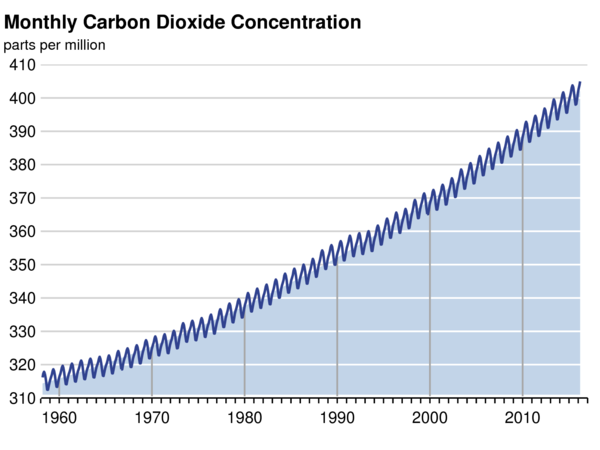- Posts: 15746
- Thank you received: 320
Climate: Why I Believe, What It Would Take To Change My Mind
- ScienceChic
-
 Topic Author
Topic Author
- Mountain Champion
-

Ahh, but the more I can grow myself, the less in fossil fuels used to truck or fly vegetables to my grocery store that I must purchase.Rick wrote: Ah yes, but composting still creates methane and C02 depending on how much oxygen it gets. So you really cant get away from killing the planet.
Ashley, bears are few and far between where I live. The mice that get in it are far worse.
"Now, more than ever, the illusions of division threaten our very existence. We all know the truth: more connects us than separates us. But in times of crisis the wise build bridges, while the foolish build barriers. We must find a way to look after one another as if we were one single tribe.” -King T'Challa, Black Panther
The truth is incontrovertible. Malice may attack it. ignorance may deride it, but in the end, there it is. ~Winston Churchill
Please Log in or Create an account to join the conversation.
- Ashley
-

- Mountain Advisor
-

- Posts: 294
- Thank you received: 29
Please Log in or Create an account to join the conversation.
- Rick
-

- Mountain Legend
-

- Posts: 15517
- Thank you received: 163
The left is angry because they are now being judged by the content of their character and not by the color of their skin.
Please Log in or Create an account to join the conversation.
- OmniScience
-

- Mountain Legend
-

- Posts: 569
- Thank you received: 3
Pretty scary when you can be fired for disagreeing with a complex scientific theory.
One thing I am 100% certain about: the Climate Conference is nothing more than a dog and pony show that will solve absolutely nothing.
Please Log in or Create an account to join the conversation.
- ramage
-

- Mountain Legend
-

- Posts: 4388
- Thank you received: 94
This post is based on many years of living here and seeing the differences in weather/climate over the years.
Please Log in or Create an account to join the conversation.
- ScienceChic
-
 Topic Author
Topic Author
- Mountain Champion
-

- Posts: 15746
- Thank you received: 320
NASA - What's the Difference Between Weather and Climate?
Feb. 1, 2005
Not explicitly mentioned is that weather is very localized geographically. Weather forecasts are made for towns and cities; climate usually refers to regions, continents, and the planet as a whole - it's not just longer-term, but bigger in area as well.The difference between weather and climate is a measure of time. Weather is what conditions of the atmosphere are over a short period of time, and climate is how the atmosphere "behaves" over relatively long periods of time.
When we talk about climate change, we talk about changes in long-term averages of daily weather.
If summers seem hotter lately, then the recent climate may have changed. In various parts of the world, some people have even noticed that springtime comes earlier now than it did 30 years ago. An earlier springtime is indicative of a possible change in the climate.
Weather is basically the way the atmosphere is behaving, mainly with respect to its effects upon life and human activities. The difference between weather and climate is that weather consists of the short-term (minutes to months) changes in the atmosphere. Most people think of weather in terms of temperature, humidity, precipitation, cloudiness, brightness, visibility, wind, and atmospheric pressure, as in high and low pressure.
In most places, weather can change from minute-to-minute, hour-to-hour, day-to-day, and season-to-season. Climate, however, is the average of weather over time and space. An easy way to remember the difference is that climate is what you expect, like a very hot summer, and weather is what you get, like a hot day with pop-up thunderstorms.
What has been documented all over the world are things like flowers blooming days and weeks earlier than they used to, insects and other animals migrating at different times than before, plants moving up in altitude or into new regions where they never used to grow, and animals that live in very niche habitats ( like the pika at altitude ) facing strains on their population due to unfavorable conditions.
The reason I bring this topic up: we've exceeded 409ppm of CO2 in the atmosphere. 2015 saw a Record Annual Increase of Carbon Dioxide Observed , and observations of what's happening in Antarctica indicate that previous estimates of sea level rise could've been significantly underestimated.
Comment on Recent Record-Breaking CO2 Concentrations
April 20, 2016
Levels exceeded 409 parts per million for the first time in recorded history this month
We are now witnessing the fastest growth rates of the entire record of CO2 measurements. This record-breaking growth is an expected consequence of the near record-breaking fossil fuel usage combined with the largest El Niño event in several decades.
The larger story remains that Earth hasn’t seen levels this high in at least several million years. Unless fossil fuel emissions soon drop significantly below current levels, I expect CO2 levels will surpass the 450 mark by around 2035 and the 500 mark around 2065.
Barring some major breakthrough that allows excess CO2 to be scrubbed from the air, it is currently an impossibility for us to reach the target of 350 ppm that many consider the threshold of dangerous climate change effects. I expect it will take at least 1,000 years before CO2 drops again below 350 ppm.
– Ralph Keeling, director of Scripps CO2 Group
The Keeling Curve is a graph which plots the ongoing change in concentration of carbon dioxide in Earth's atmosphere since 1958. It is based on continuous measurements taken at the Mauna Loa Observatory in Hawaii that began under the supervision of Charles David Keeling.
scrippsco2.ucsd.edu/
Why does increased CO2 matter? It, along with other greenhouse gases, increase the temperature of the atmosphere (and CO2 also dissolves in the ocean making it more acidic).
What is the best description of the greenhouse effect?
Filed under: Climate Science — rasmus @ 12 February 2016
The starting point was to look at the bulk – the average – heat radiation and the total energy flow. I searched the publications back in time, and found a paper on the greenhouse effect from 1931 by the American physicist Edward Olson Hulburt (1890-1982) that provided a nice description. The greenhouse effect involves more than just radiation. Convection also plays a crucial role.
How does the understanding from 1931 stand up in the modern times? I evaluated the old model with modern state-of-the-art data: reanalyses and satellite observations.
"Now, more than ever, the illusions of division threaten our very existence. We all know the truth: more connects us than separates us. But in times of crisis the wise build bridges, while the foolish build barriers. We must find a way to look after one another as if we were one single tribe.” -King T'Challa, Black Panther
The truth is incontrovertible. Malice may attack it. ignorance may deride it, but in the end, there it is. ~Winston Churchill
Please Log in or Create an account to join the conversation.
- FredHayek
-

- Mountain Legend
-

- Posts: 30528
- Thank you received: 179
I have lived in South Park for years and the 1970's we saw historic snowfalls. A couple times we were only able to use a snowmobile to get groceries. The plows had the snow 10 feet high in the Park. But in the 80's we would have winters where we wouldn't use the plow at all.
So the 70's did look like the Ice Age was coming back like Time predicted. And the 80's you would have believed AGW was correct and doom was at hand.
Thomas Sowell: There are no solutions, just trade-offs.
Please Log in or Create an account to join the conversation.
- ramage
-

- Mountain Legend
-

- Posts: 4388
- Thank you received: 94
I agree. The climate is a long term compilation of weather. Over the course of time, meaning eons, the climate does change. I also agree that the influence of man ( anthrpogenic global warming- AWG) as well as other animals, fauna, flora, and the sun influence the climate. It is the height of hubris to think that man can manipulate the climate. That is exactly what the "climate changers" are saying man can do.
It appears that AWG is a substitute for a deistic religion. But AWG supporters don't put their money where their mouth is, i.e., they are using automobiles, relying on coal derived energy systems to power their cars, heat or cool their homes to a "temperature" that is more comfortable for them, etc.
Finally what is the goal of the warriors of AGW? To maintain the climate that they experienced in their lifetimes, (suspiciously like denying a religious faith and denying death)?
In the Rocky Mountains, the climate has changed, the diaries of the the Fur Traders, the earliest written records we have of "weather", "climate", show that. Read Jedediah Smith journals as a start.
Please Log in or Create an account to join the conversation.
- ScienceChic
-
 Topic Author
Topic Author
- Mountain Champion
-

- Posts: 15746
- Thank you received: 320
First you say, "I also agree that the influence of man ( anthrpogenic global warming- AWG) as well as other animals, fauna, flora, and the sun influence the climate."
But your very next sentence, "It is the height of hubris to think that man can manipulate the climate." is the complete opposite. To me, the terms "influence" and "manipulate" are two sides of the same coin...so are we or aren't we?
I appreciate your thoughts on this.
"Now, more than ever, the illusions of division threaten our very existence. We all know the truth: more connects us than separates us. But in times of crisis the wise build bridges, while the foolish build barriers. We must find a way to look after one another as if we were one single tribe.” -King T'Challa, Black Panther
The truth is incontrovertible. Malice may attack it. ignorance may deride it, but in the end, there it is. ~Winston Churchill
Please Log in or Create an account to join the conversation.
- ramage
-

- Mountain Legend
-

- Posts: 4388
- Thank you received: 94
I continue to marvel at those who wish to alter climate change and yet are unable to state what is the climate that they are trying to maintain.
Please Log in or Create an account to join the conversation.






